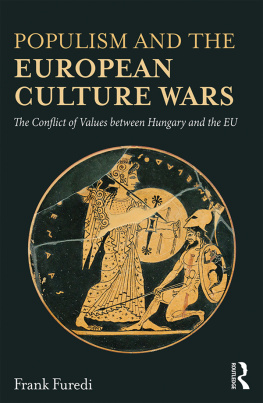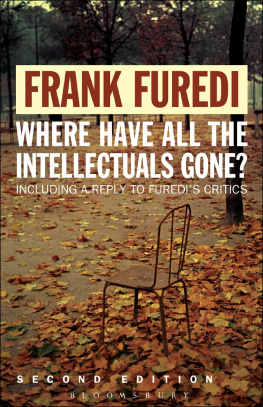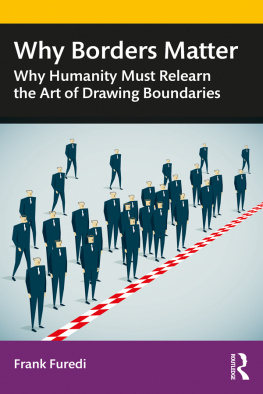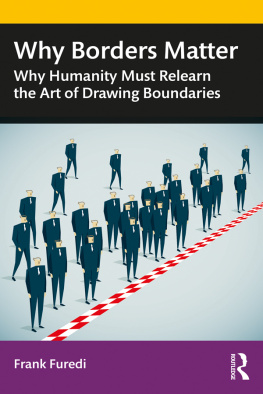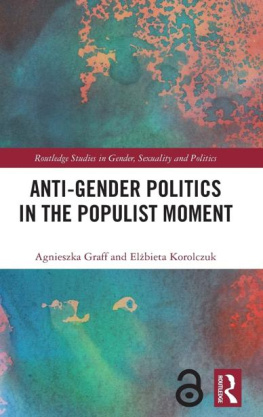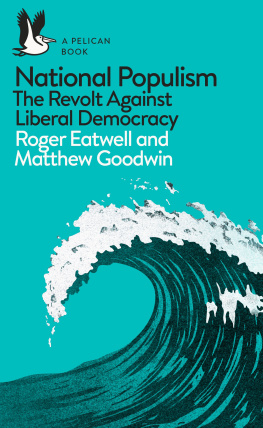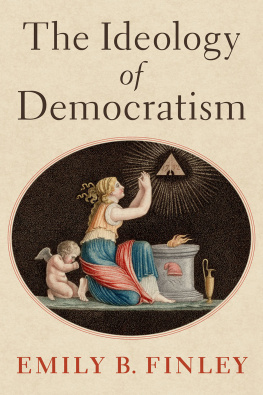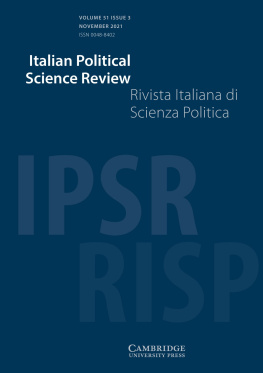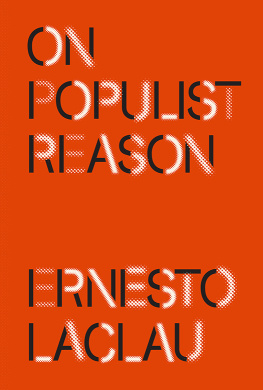First published 2018
by Routledge
2 Park Square, Milton Park, Abingdon, Oxon OX14 4RN
and by Routledge
711 Third Avenue, New York, NY 10017
Routledge is an imprint of the Taylor & Francis Group, an informa business
2018 Frank Furedi
The right of Frank Furedi to be identified as the author of this work has been asserted by him in accordance with sections 77 and 78 of the Copyright, Designs and Patents Act 1988.
All rights reserved. No part of this book may be reprinted or reproduced or utilized in any form or by any electronic, mechanical, or other means, now known or hereafter invented, including photocopying and recording, or in any information storage or retrieval system, without permission in writing from the publishers.
Trademark notice: Product or corporate names may be trademarks or registered trademarks, and are used only for identification and explanation without intent to infringe.
British Library Cataloguing-in-Publication Data
A catalogue record for this book is available from the British Library
Library of Congress Cataloging-in-Publication Data
A catalog record for this book has been requested
ISBN: 978-1-138-09740-7 (hbk)
ISBN: 978-1-138-09743-8 (pbk)
ISBN: 978-1-315-10489-8 (ebk)
Typeset in Bembo
by Apex CoVantage, LLC

In recent years I have become concerned about the development of an anti-populist cultural zeitgeist in Western societies. Such sentiments are particularly influential within the media and cultural and educational establishments. These institutions have adopted the habit of applying the populist label to movements and groups whose values contradict their own. Populism is not used as a neutral term of description: it conveys the connotation of moral inferiority. Narratives about populism also often suggest that these movements are dangerous, extreme, and a threat to a democratic society.
In Europe the anti-populist narrative is frequently directed at Eurosceptics, whose opposition to the European Union (EU) is often portrayed as a cultural crime. Old oligarchical claims about the gullibility, ignorance, and irrationality of the masses, which were originally formulated in Ancient Greece, are frequently recycled through the anti-populist condemnation of people who vote the wrong way. During my discussions with educated supporters of the EU, I have often found myself having to defend citizens who voted for Brexit from the charge of racism or fascism.
Disappointment with the capacity of the people to vote the right way has led to the publication of a spate of anti-populist literature that questions the value of democracy itself. Such sentiments gained considerable force after Britains vote for Brexit and especially after the election of Donald Trump as President of the United States. That so many commentators appeared to be so selective about their commitment to democracy indicates that one of the most fundamental values of an enlightened and open society is the danger of losing its moral authority. So although the medias attention is focused on the supposed threat posed by populist movements, I have drawn the conclusion that the anti-populist reaction to them, represents a far greater menace to democratic politics.
My concern about the anti-populist turn of Western elite culture was reinforced by the way that my country of birth Hungary has been portrayed in the media. Hungary has become one of the favourite targets of anti-populist currents in Western Europe. To try to make sense of the tensions that have erupted between the leaders of the EU particularly the European Commission and the Hungarian government, I undertook a study of the key issues at stake in this dispute. As I explain in this book, these tensions are the international reflection of the cultural conflicts that often occur within the domestic sphere between populist and anti-populist interests.
I have found this book a difficult one to write. Despite my attachment to the political values of popular sovereignty, secular humanism, freedom of speech, and freedom of movement, I have found myself defending a nationalist, Christian conservative government from criticisms that I consider to be manifestly unfair. Though many of Hungarys critics perceive themselves as liberal, their anti-populist sentiments are characteristically illiberal and disturbingly intolerant. They often come across as latter-day cultural imperialists who feel that they have the right to impose their values on Hungarian society and who have no inhibitions about lecturing Hungarians on how to live their lives. They do not seem to realize that the problems facing Hungarian society will be only resolved through the efforts of its people, not by foreign advocacy organizations meddling in the affairs of an independent sovereign nation.
During my stay in Budapest it became evident to me that many Hungarians do not understand why their political culture is condemned with such hostility by sections of the Western media. They are often surprised to discover that what they perceive as their old-fashioned ways are sometimes regarded as anathema by foreign observers. I hope this book helps them to gain insight into the dynamics of what is, in many ways, a confusing conflict over the values that give meaning to peoples lives. At the same time I hope that my Western readers will find this book useful for gaining an insight into the cultural values that motivate the behaviour of their Eastern neighbours. Cultural tensions between West and East Europe refract conflicts that also lie deep within Western societies.
The current Culture War against populism is often focused around different conceptions of history: the meaning of the past and its relevance for today. While in Budapest, I enjoyed the hospitality of the Institution for the Research on Eastern and Central European History and Society. The head of this institute, the eminent Hungarian historian Dr Mria Schmidt, strongly supported my attempt to formulate my ideas about the politics of memory in the Hungarian context.
A grant from the Arthur Koestler Research Programme greatly assisted the research that I carried out for this book. I am grateful to the institutes archivist Orsolya Bki for directing me towards important Hungarian sources that helped me clarify my confusions. Dr Vanessa Pupavac of Nottingham University helped me understand how the European Commissions attitude towards Hungary is paralleled by its imperious behaviour in the Balkans.
Note
See for example Brenan, J. (2016) Against Democracy , Princeton University Press: Princeton.
Abts, K. & Rummens, S. (2007) Populism versus Democracy, Political Studies , vol. 55, no.2.
Adorno, T.W. (1950) Democratic Leadership and Mass Manipulation, in Gouldner, A. (ed), Studies in Leadership: Leadership and Democratic Action , Harper & Brothers: New York.
Arendt, H. (1951) The Origins of Totalitarianism , Harcourt Brace Jovanovich: New York.
Arendt, H. (1956) Authority in the Twentieth Century, The Review of Politics , vol. 18, no.4.
Arendt, H. (2006) What Is Authority, in Arendt, H. (ed), Between Past and Future , Penguin Books: London.
Auer, S. (2010) New Europe: Between Cosmopolitan Dreams and Nationalist Nightmares, JCMS: Journal of Common Market Studies , vol. 48, no.5.
Baumeister, A. (2007) Diversity and Unity the Problem with Constitutional Patriotism, European Journal of Political Theory , vol. 6, no.4.
Beck, U. (2005) Power in the Global Age: A New Global Political Economy , Polity Press: Cambridge.

